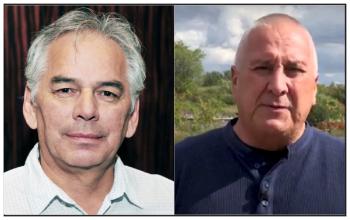Image Caption
Summary
Local Journalism Initiative Reporter
Windspeaker.com
The Mohawk Council of Kahnawà:ke (MCK) is “strategizing” now that the French language Bill (96) is about to become law in Quebec.
“Obviously, we’re not going to share strategy publicly at this time or any point of time but our noses are to the grindstone and work continues. We will continue to push,” said Michael Delisle, Jr., former grand chief for MCK and now portfolio holder for economic development and external government relations.
Delisle confirmed the promise he made when speaking to Windspeaker.com earlier in May: It’s going to be a “hot and uncomfortable summer.”
There have already been protests of the legislation in Kahanawà:ke.
Despite hopes that the Coalition Avenir Quebec (CAQ) government, led by Premier François Legault, would hold off in approving the bill that Indigenous leaders and anglophone groups say will severely hamper their ability to get most services in English, CAQ went ahead and passed Bill 96 on May 24.
Almost instantly, Indigenous Affairs Minister Ian Lafreniere said he was committed to supporting Indigenous people and promised they wouldn’t be impacted by the law, which aims to make French the only official language in the Quebec.
Delisle calls Lafreniere’s pledge to support Indigenous people in the province “words in the air…given the actions that have been taken” to this point.
Lafreniere also criticized “fake news” for “stirring people up.”
Delisle takes exception to that categorization pointing out that MCK and the Assembly of First Nations Quebec and Labrador (AFNQL) presented the National Assembly in writing with their concerns months ago.
“To tell us consistently and constantly we're overplaying it, we're reading it wrong, we don't understand. Come on, people. I mean we're not, I hate to say it, poor little Indians that were trustworthy 150 years ago. We have our own legal people. We have our own legal body within the Mohawk Council of Kahnawà:ke. Maybe we're not all constitutional lawyers…(but) you can't consistently tell us we’re wrong. We have data telling us that we are not wrong,” said Delisle.
In a statement, AFNQL Chief Ghislain Picard denounced Quebec’s “meanness and narrow-mindedness” in passing the bill.
He added that Quebec was “taking a major step backwards, putting reconciliation with First Nations on hold with a questionable future.”
Concerns over the bill include the isolating impact doing business in French-only will have on Indigenous communities that operate in English and their Indigenous language. Health services, legal services and social services off-reserve will be offered in French, and contracts to be signed for economic development on reserve will have to be in French. It will also be difficult for students to meet French language class requirements to qualify for community college.
The full impact is “yet to be determined,” said Delisle.
In speaking with Windspeaker.com prior to the bill being passed, Delisle said that some of the actions being considered to fight the new law included blocking access to infrastructure in MCK territory, such as the international waterways of the St. Lawrence Seaway, railways, CP rail, Mercier Bridge, highways, and municipal roads.
Legal action is also on the table, he says, despite Quebec implementing the notwithstanding clause in the preamble of Bill 96.
The notwithstanding clause allows provincial legislatures to temporarily override sections of the Charter of Rights and Freedoms while shielding them from many court challenges.
It’s the second time in three years that Quebec has invoked the notwithstanding clause in the preamble of a bill. Bill 21, supporting secularism, bans civil servants from wearing religious symbols while on the job and came into force in June 2019.
Delisle expects the federal government to take action as well.
Already Justice Minister David Lametti has spoken up saying the federal government has authority to challenge provincial laws. However, he says, the lead to fight the bill should come from Quebeckers.
In an Opinion piece that ran in the Montreal Gazette on May 25, five Liberal MPs from Quebec wrote, “… the threats to French in Quebec are not posed by Quebec’s English-speaking minority community… As federal MPs, we have closely watched the development of Bill 96 through the legislative process. We are very concerned that the bill removes certain fundamental rights for English-speaking Quebecers. The removal of those rights does not appear to contribute constructively to the laudable goal of protecting the French language.”
They concluded with, “We believe it is possible to promote French throughout Canada and recognize the threats faced by Francophones in Quebec while respecting the rights of English-speaking Quebecers. We will keep working with both communities to find that balance.”
The (federal government) has “an obligation because as far as we know and believe, and prove us wrong, Quebec is still part of the dominion. They’re still a province under Canada. (Lametti) as well as the Prime Minister on behalf of the government have no choice but to intervene when human rights are at stake. And that's what we believe Bill 96 is,” said Delisle.
As for Lafreniere saying “fake news” is fearmongering, Delisle said, “We have every right to be, I won't call it fearful, but keeping a close eye and watching what (the Quebec government is) doing.”
Local Journalism Initiative Reporters are supported by a financial contribution made by the Government of Canada.

